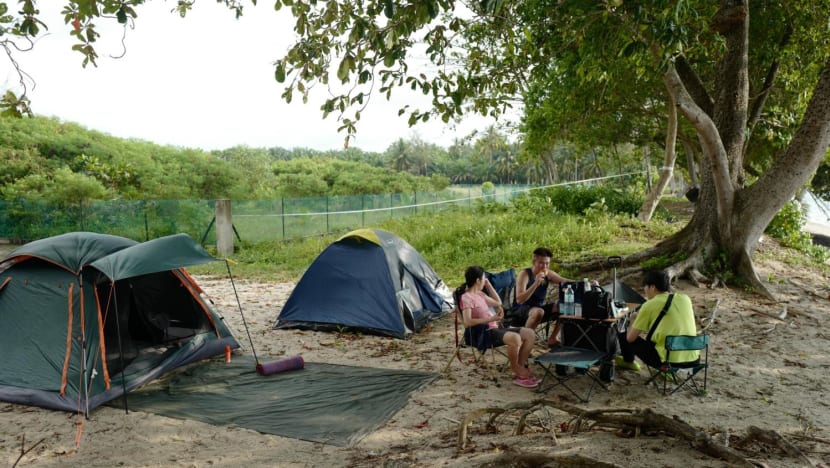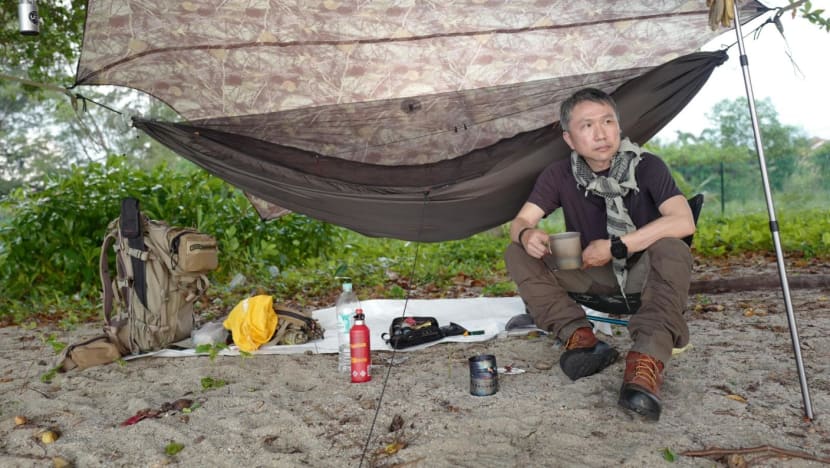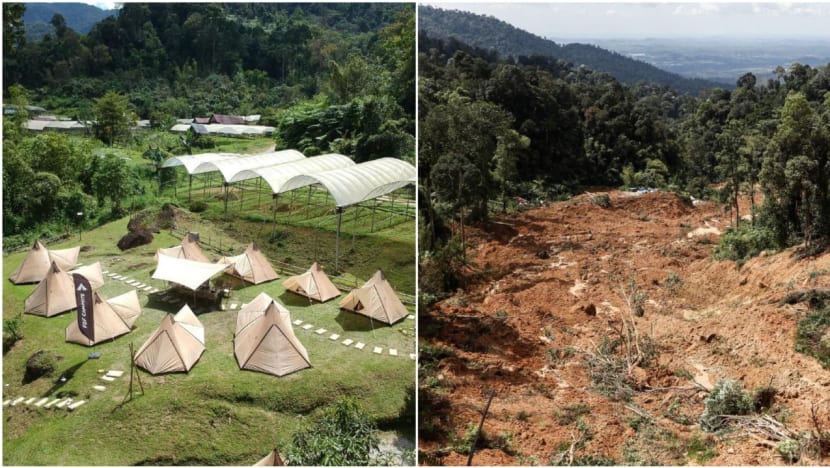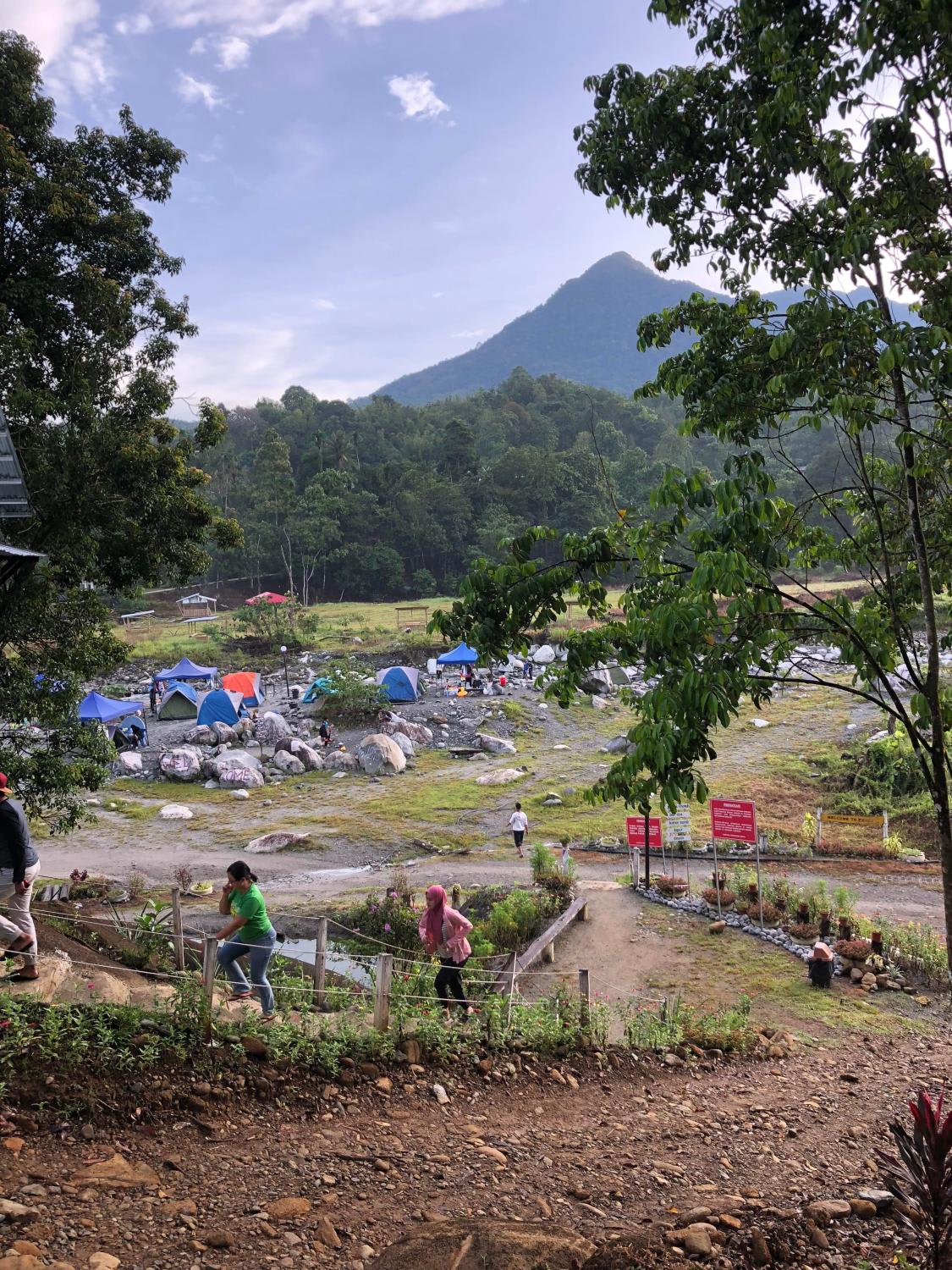Singaporean campers postpone Malaysia trips amid monsoon, say landslides hard to predict
The campers say it is important to check the weather before heading out, as heavy rain and lightning could mean flash floods or falling trees.

Singaporeans at a campsite in Johor, Malaysia. (Photo: Donald Pang)
SINGAPORE: Camping enthusiast Donald Pang had planned to go on a camping trip in Johor this month with three friends, but decided to postpone it amid Malaysia's ongoing monsoon season that has triggered deadly floods and landslides in some states.
"If you're on high ground, you might not get floods but you might have landslides," the 59-year-old marketing executive told CNA on Wednesday (Dec 21).
"And if it is raining or stormy weather, there is also a possible risk of fallen trees and branches that might hit you. Unless you camp in open ground, but open ground also has lightning danger. So, there is a higher risk."
Furthermore, constant rain would make the camping experience less enjoyable, Mr Pang said, pointing out that campers would have to stay in their tents instead of enjoying the outdoors.
"So with all these factors, I think we can put (the trip) off. If we really wanted to camp, we can always camp in Singapore – in Ubin, East Coast or Pasir Ris," he added.
Mr Pang's comments come after a landslide smothered a campsite at Father's Organic Farm in Selangor – near popular tourist attraction Genting Highlands – on Dec 16, killing 26 people with another seven missing. Search operations are ongoing.
Authorities said 94 people were at the campsite when disaster struck in the wee hours of the morning, adding that the site was only licensed for organic farming and was hence operating illegally. Three Singaporeans were rescued.
Singaporeans who go camping in Malaysia told CNA that the country is a popular camping destination due to its proximity to Singapore. It is also affordable to camp in Malaysia, with a wide range of campsites – varying in terrain and environment – to choose from, they said.
The Singaporeans said they would usually not check if a campsite had the necessary licences or permits to operate, instead trusting others who have gone before and their own risk assessment of the area.

Mr Pang, who has camped in Johor, Pahang and Selangor and goes on roughly one camping trip a month, said he does not really check for licences, especially for established campsites that have been around for a few years.
"Generally, it never crossed our minds when camping is concerned. It's unlike when you're seeking medical advice or a clinic or hospital, where you're concerned about whether it's legitimate," he said.
"For camping, you just camp and sit down there. Most people will check what facilities the campsite has."
Nevertheless, Mr Pang said it is important to check the weather in the area at least six days before heading out up to the actual day, as it could be a "matter of life and death". For the monsoon season in Malaysia, campers should bring proper wet weather gear, he said.
Location is also an important factor. For instance, camping by a stream could mean vulnerability to dangerous flash floods, said Mr Pang, who runs the Camping Singapore Facebook group with more than 2,000 members.

While authorities are still investigating the cause of the recent fatal landslide in Malaysia, an expert told CNA that it was likely an effect of intense rain during past weeks.
The rain led to what is called an "earthflow", after the slope gets saturated and slip surfaces deep inside the ground are formed, said Dr Nor Shahidah Mohd Nazer of the Department of Earth Science and Environment at Universiti Kebangsaan Malaysia.
Even with all precautions taken, Mr Pang cautioned that landslides could happen "anywhere" and were difficult to predict.
"The incident was very tragic, especially when it happened to a campsite where people were camping and enjoying nature," he said.
"I'm not saying that landslides which involved victims on other occasions are less serious. But when this happened to campsites and campers, it really saddened me quite a lot."
Mountaineer Jeremy Tong, who organises camping and summit trips to Gunung Ledang in Johor about eight times a year, acknowledged that landslides were "quite common" in Malaysia.
"But that kind of scale (near Genting) was quite shocking. I'm not sure about the area itself, but I think that it was honestly quite scary," said the 32-year-old, who works as an outdoor education specialist at United World College of South East Asia.
Mr Tong used to camp frequently around Gunung Tahan in Pahang more than a decade ago. He said he usually avoids trees and streams when picking a campsite, noting that these could lead to deadfall and flash floods after rainy weather.
"We never really look out for mudslides, because it's very hard to predict that kind of soil erosion at that kind of level," he said.

Mr Tong also said he does not check if campsites were licensed, as he usually travels with local guides who knew the places better. "We will assume that (the campsites) would have the appropriate permits to operate in those areas," he said.
Mr Tong said his two-day trips to Gunung Ledang are popular among Singaporeans as many are looking for weekend getaways and do not mind taking an extra day to camp before summitting the mountain.
"Camping in Malaysia is quite cheap, and it's also not that far. It's affordable and accessible, that's why there's a lot of people that want to go out there," he added.
Ms Margaret Wong, who camps in Malaysia once every few months, said landslides have occurred at the hills around Genting "for years".
"It wouldn’t be my first choice to camp at such an unstable slope in the first place," said Ms Wong, who did not give her age.
"I wouldn't say it is the safest to camp at the seaside, but it is a better place compared to hilly surfaces."
Ms Wong said landslides were "simply unpredictable", stressing that campers should also avoid setting up near embankments, or natural barriers created from earth material dug out during construction.
"As for camping in Singapore, safety precautions often (involve) wild animals and weather," she added.













